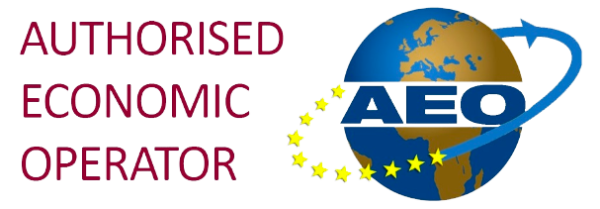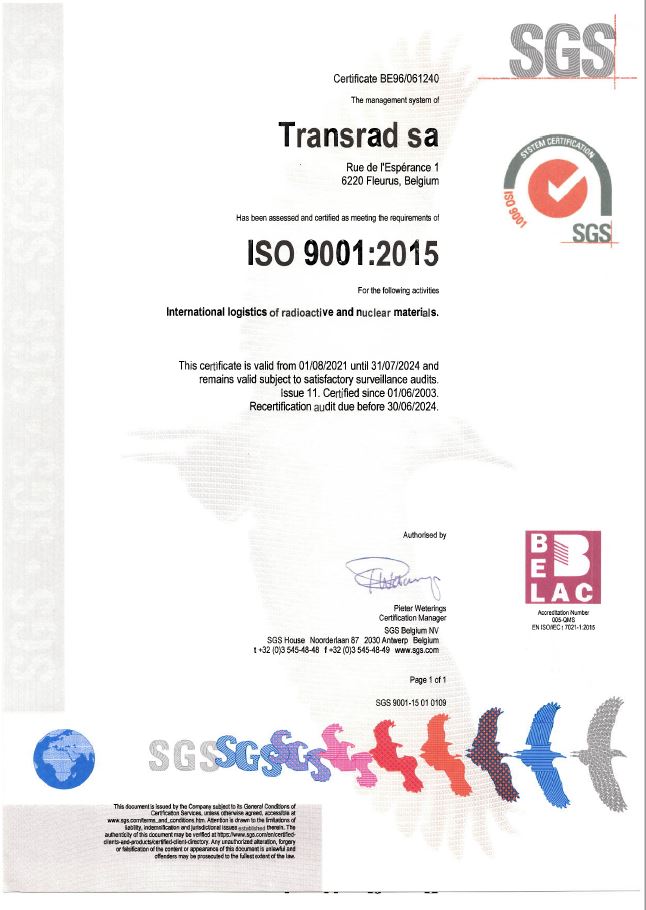About
TRANSRAD is a team of experts specialising in nuclear logistics. We work with you to help the health, energy, industrial and environmental sectors evolve.

TRANSRAD is a team of experts specialising in nuclear logistics. We work with you to help the health, energy, industrial and environmental sectors evolve.
TRANSRAD SA was founded in 1988 and is one of the world’s leading companies specialising in radioactive and nuclear transport and the different activities associated with this.
Our dedicated team is here to help you fulfil your transport needs as well as with other requirements, with rigour and attention to detail.
TRANSRAD shareholders are:
All of TRANSRAD’s employees understand their social responsibility towards both the public and the environment.
TRANSRAD is a team of experts specialising in nuclear logistics. We work with you to help the health, energy, industrial and environmental sectors evolve.
Our mission is to provide international logistics services for radioactive and nuclear materials. Our technical measures and procedures guarantee customised services for our partners. We have a social responsibility to guarantee safety: we are proud to serve the community by providing efficient, reliable services. Our employees are polite, dedicated to their work and totally committed.
We are ISO 9001 certified for the transport of nuclear and radioactive materials and associated activities.
Our employees carry out ongoing training, and we closely monitor the latest techniques and developments at all times. You can’t have quality without safety: that’s why, every year, our drivers complete a skid-control course so that they can stay in control of their vehicle in any situation. They control their vehicle both defensively and offensively.
Our offices have 4 physical safety barriers.
All of our vehicles are fitted with a specific anti-theft and anti-sabotage system, protecting both the vehicle itself and its load.
AEO Certification
In a continuous improvement process and in search of excellence, Transrad has obtained the AEO (Authorized Economic Operator) status for customs simplification as well as for safety and security. Transrad adds another piece to its edifice and provides an ever more complete and professional logistic support service.


TRANSRAD undertakes to take all necessary and useful measures to guarantee maximum safety for its transport activities.
Radioactivity is a natural phenomenon, characterised among other things by the emission of ionising radiation. Air, water and soil all contain radioactive elements to a greater or lesser extent, which naturally expose people and the environment to some radiation.
As well as this natural radioactivity, ionising radiation generated by the nuclear industry can have an effect both on people and the environment. These include irradiation and contamination, the most serious dangers presented by ionising radiation.
In order to protect workers, members of the public and the environment from ionising radiation, a number of protective systems and measures are implemented when designing, building and running a nuclear facility, right up until it is permanently decommissioned. That is what we refer to as nuclear safety.
In Belgium, a number of nuclear safety authorities are responsible for protecting workers, the public and the environment against the risks associated with nuclear activities. To this end, they oversea the nuclear industry’s installations and activities.
Safety is a major concern for TRANSRAD as well. By respecting rigorous procedures and implementing control systems, TRANSRAD undertakes to take all necessary and useful measures to guarantee maximum safety for its transport activities. TRANSRAD pays particular attention to the safety of its workers, local residents and the public as a whole.

While the first facilities date back more than 30 years, it is estimated that approximately 200 medical cyclotron facilities worldwide are awaiting dismantling by 2040. This is equivalent to processing 18,000 tons of steel and other metals in the most sustainable way possible. Five Belgian companies (IBA, Interboring, IRE, SCK CEN and Transrad) – specialists in dismantling and nuclear medicine – are joining forces for this purpose. Under the name “CYCLADE” (CYCLotrons Advanced DEcommissioning), this grouping offers operators a circular solution for increasing the amount of waste recycled.
CYCLADE brings together the expertise and synergies of the five partners in order to meet the needs of sites wishing to decommission or dismantle an existing accelerator and its associated facilities, including cyclotrons. This consortium is a combination of industrial companies, SMEs and research centres offering a turnkey decommissioning solution from the study phases to the final management of materials.
This initiative is necessary because the era of nuclear decommissioning and dismantling is upon us. Most of the first accelerators installed in the medical field 30-40 years ago are now reaching the end of their life span. There are an estimated 50 decommissioning projects by 2030 and 200 by 2040. “And it doesn’t stop there. In 2021, the global medical cyclotron market reached a value of $192.6 million. This figure is expected to rise to $323 million by 2027, showing that the demand for decommissioning is far from reaching its peak,” says Guido Mulier, Senior Business Development Manager at SCK CEN.
Medical accelerator operators are forced to decommission and dismantle their cyclotrons because older equipment cannot always be upgraded. Some components or the entire machine are simply too old. A decommissioning operation in a radioactive environment is no small task in itself, but in a medical environment it is even more complex. “There are many constraints associated with the operation of a building where patients are treated, such as a hospital. Add to this the still open questions about the optimal recycling of all decommissioned materials, and you have a huge challenge,” explains Gilles Degauque, General Manager of Transrad.
CYCLADE ensures that the operator is not alone. It offers a comprehensive circular solution for the dismantling of accelerators/cyclotrons and their concrete bunkers: from an environmentally and economically sound strategy to the appropriate administrative workflow. From the safety of dismantling work and nuclear transport. And all this with the aim of finding the optimal solutions in order to reduce radioactive and conventional waste.
A special feature of this partnership is that the decommissioning/dismantling processes to be implemented will determine the design of future cyclotrons. By combining the strengths of all the partners, the design of future devices can be optimised so that future decommissioning is more efficient and less costly. “In addition, we are looking together for better dismantling techniques, for example by testing whether we can recycle radioactive materials with melting furnaces,” Guido Mulier adds.
Grégory Delécaut, head of the IRE Lab department, comments: “The CYCLADE consortium offers a solution to the unprecedented challenge of dismantling cyclotrons. It benefits from the wide range of know-how and the unique consolidated experience of a consortium of world-renowned Belgian organisations.”
Jos Spilstijns, CEO of Interboring, adds: “The collaboration between the five partners creates a one-stop shop for the market looking for an integrated solution for the dismantling of cyclotrons and other particle accelerators.”
“IBA’s participation in the CYCLADE consortium reflects our commitment to take into account systematically the consequences for societies of our activities and the interests of all our stakeholders (patients, shareholders, employees, customers, suppliers, the community, the planet, etc.),” explains Olivier Legrain, IBA CEO. “Integrating the issue of dismantling and waste management into the very design of our accelerators is part of this approach, which is formalised in our B Corp certification.”
IBA (Ion Beam Applications S.A.) is the world leader in particle acceleration technology applied to medicine. The company is the leading supplier of equipment and services in the field of proton therapy, considered the most advanced form of radiation therapy available today. IBA is also a leading player in the fields of industrial sterilisation, radiopharmacy and dosimetry. The company, based in Louvain-la-Neuve, Belgium, employs more than 1,800 people worldwide. IBA is a certified B Corporation (B Corp) which meets the highest standards of social and environmental performance. The company is listed on the pan-European stock exchange, EURONEXT. (IBA: Reuters IBAB.BR and Bloomberg IBAB.BB).
For more information: www.iba-worldwide.com
Founded in 1983, Interboring is a Limburg-based family business specialising in drilling and cutting concrete and metal, whether activated or contaminated or not. Industrial diamond drilling and sawing techniques are used. Interboring has thirty years of experience in the nuclear sector and carries out assignments for all the nuclear authorities in Belgium, ranging from the Doel and Tihange power plants and the SCK CEN study centre, to work for the ONDRAF/NIRAS radioactive waste storage and management authority.
For more information: www.interboring.be
IRE or the National Institute for Radioelements is a public utility foundation, whose main activity is the production of radio-isotopes for nuclear medicine. Founded in 2010, its subsidiary IRE ELiT develops radiopharmaceuticals used for the imaging and treatment of certain cancers and palliative care. IRE also contributes to the protection and monitoring of the environment through a unique approach to the measurement and monitoring of radioactivity. IRE performs both on-site measurements and laboratory analyses on a wide variety of samples. In this context, IRE has national and international experience in the radiological characterisation of accelerators and their bunkers, of facilities to be decommissioned and of the radioactive waste produced. IRE and its subsidiary currently employ 250 people and are world leaders in their field of activity.
For more information: www.ire.eu
SCK CEN is one of the largest research institutions in Belgium. Every day, more than 850 employees dedicate themselves to developing peaceful applications of radioactivity. SCK CEN’s research activities focus on three main areas: the safety of nuclear facilities, the development of nuclear medicine, and protecting people and the environment from ionising radiation. SCK CEN is world-renowned and shares its knowledge through countless publications and training courses, so that this pool of exceptional competence can be maintained.
For more information: www.sckcen.be
Transrad has been exclusively active in the transport and logistics of radioactive and nuclear materials since 1988. Transrad is the largest transporter of radioactive and nuclear materials in Belgium and ranks among the leading players in Europe and worldwide in this field. Transrad is present in all modes of transport (road, rail, air and sea) and employs 40 people. More than 4,000 shipments are carried out each year for:
For more than three years, our strategy has been redefined in order to develop our positioning in the context of the general evolution of the Belgian nuclear fleet and in the context of diversification, particularly in the field of plant decommissioning. To this end, we have, among other things, acquired a storage capacity for radioactive materials (two class II sites approved by the Federal Agency for Nuclear Control) as well as a class 7 transport interruption capacity for 15 days on our secure site in Fleurus. In addition, we are continuing to develop our own fleet of packaging dedicated to radioactive and nuclear materials.
For more information: www.transrad.be